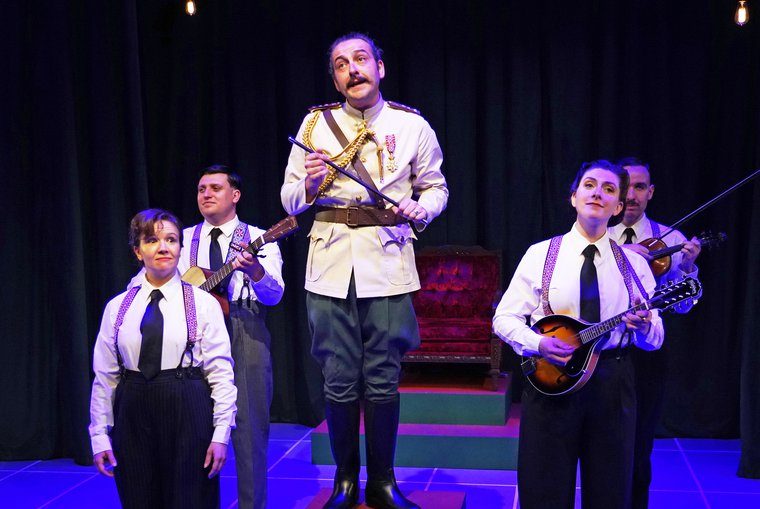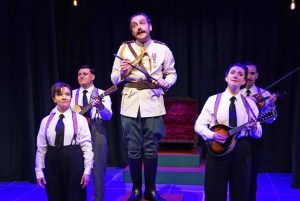

David Leopold, Claire Fraenkel, Joseph Cullen, Lawrence Boothman, and Sasha Wilson in The Brief Life and Mysterious Death of Boris III – King of Bulgaria. Photo by Carol Rosegg.Stagebiz is happy to post an interview with Joe Cullen, Co-Author of The Brief Life and Mysterious Death of Boris III, King of Bulgaria, which recently finished a run at 59 E. 59 Theaters
Boris III of Bulgaria is a rather obscure historical figure to most of us, including historians, so what is it about his situation that interested you?
Firstly, co-writer Sasha Wilson is American Bulgarian and her O’papa (grandad) introduced us to this incredible story in 2017, via the book Crown of Thorns by the son of one of Boris III’s advisors. There are family connections to this period and this place, and it meant a lot to be able to write about it. At the heart of this story though is one individual and an impossible situation: a very human experience. We have all been in the position where one person says this, and another says that, but they are both lying and one is your uncle and the other owes you £900 and this and that and what do you do? You do your best. And sometimes you really screw up. And this is happening on a national and global level. And your decisions have real consequences. And everyone can connect with that. And Bulgaria’s story deserves to be told. And we are tired of the UK and USA thinking they are the only winners, because the ‘extraordinary ordinary’ people in 1943 Bulgaria deserve to have their story told.
What sort of research did you need to do for the piece?
After reading Crown of Thorns, we searched for every book we could find in the English language on the topic of Boris III and Bulgaria during WWII. The most important book we read was Beyond Hitler’s Grasp by Michael Bar-Zohar, and it is from this that we structured our play. There’s a lot we had to miss out of course – including Dimitar Peshev, who was integral to the rescue of the nearly 50,000 Jewish Bulgarians. We have included a bibliography in the printed edition of our play text; so, for any history nerds who want to read more – treat yourself to a copy!
Would you consider the piece to be more influenced by history or historically accurate? Put differently, is it a historical work of fiction, or a documentary?
It is a close to a documentary as we can reasonably be expected to make based on limited resources. So much of this period is unknown. We have no footage of these people. It’s also a theatrical play; and we as actors have to make choices that distinguish the many characters from each other. There is bias to every piece of storytelling, and every recorded piece of ‘documentary history’, and we have done our best to make this complicated nuanced period accessible to a wide audience, in only 80 minutes. So yes, we have missed things out and truncated some timelines for clarity, and we have elided figures from history into solitary representative roles e.g., Anka Lazarov, Metropolitan Stefan, Advisor 3. But where possible we have stayed true to the emotional facts, and the recorded accounts.
Was finding a King Boris difficult or was the role written with someone in mind?
So, I (co-writer, Joe) wrote the role for myself. We have anecdotal accounts of Boris which pepper the script (e.g., he did dress up in peasant garb and help people out with odd jobs, he loved hiking and yoga) but the characterisation I have chosen is one that affords Boris one foot in 1943 and one foot in 2024 – he always has a relationship with his audience (“the Bulgarian people”), this is all for show, a story. Hitler described Boris as a “wily fox”, and this inspired the physical movement of my performance. There are also moments where Boris is grotesque, and he needs to be, because he did ally with Germany.
You have made music a significant part of the show. What choices did you have to make to get the music to work as part of the story?
We have been really blessed with the musical support we have received on this show. Firstly, we worked with Dessi Stefanova of The London Bulgarian Choir who taught us how to sing “Mila Rodino,” the National Anthem (current National Anthem). Our director Hannah introduced some Hebrew songs (“Avinu Malkeinu” & “Shalom Aleichem”) to the show and directed some very powerful moments where they are used to underscore. Our Artistic Associate David Leopold has musically arranged all the songs for vocal harmonies and accompaniment by violin, guitar, mandolin and flute (and introduced us to “Have A Little Talk With Jesus” which he sings marvellously). Music is used to suggest the passage of time, or to create a particular emotional tone. This is not a musical, rather a play with music. We have chosen songs that are evocative, and ideally written in or listened to in the early 1940s.
Do audiences in the US respond differently to audiences in Europe?
Yes and no. We find every night is different, and certain lines get laughs most of the time, or some of the time, and occasionally never, and the tone of the piece shifts. There are certain moments in the play where we as actors can gauge how invested the audience is, and we shift the pace of the piece to accommodate. It makes it truly live each night, and that’s the beauty of doing 7 performances a week! American audiences are very gracious, and we are enjoying meeting the Bulgarian and Jewish audience members who are connecting with the show.
Is there a chance of a film version?
We hope so! Or a limited TV series. We are open to discussions, and have made a start on a pilot episode; so, if you can help… contact us!
What is next for the Out Of The Forest Theatre?
We are working on two new projects at the moment: a piece about Dostoevsky and Crime & Punishment, and a play about French writer Jean Genet. We are also considering revisiting our Off West End Award-Winning show Bury The Hatchet about Lizzie Borden. We are open to suggestions though, so get in touch if you have any incredible misremembered or forgotten stories from history!
 Monday, January 5, 2026
Monday, January 5, 2026